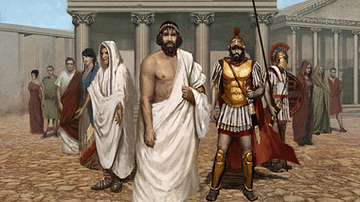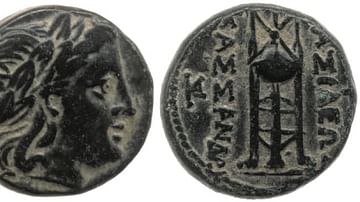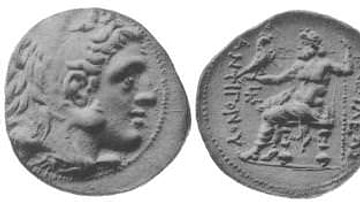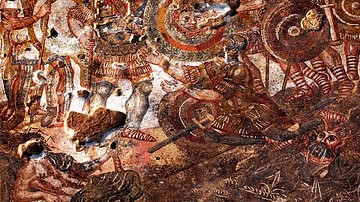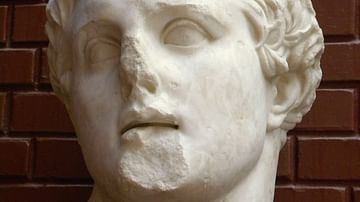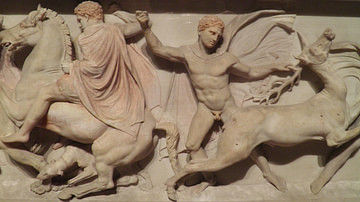History is not predictable; in many ways it can take on a life of its own. But sometimes, an individual's sheer presence is enough to bend history to his will. One such individual was Alexander the Great. Through his conviction, vision, mental dexterity, oratory, and superb physical endurance he was able to shape destiny, for himself and for the lands he conquered.
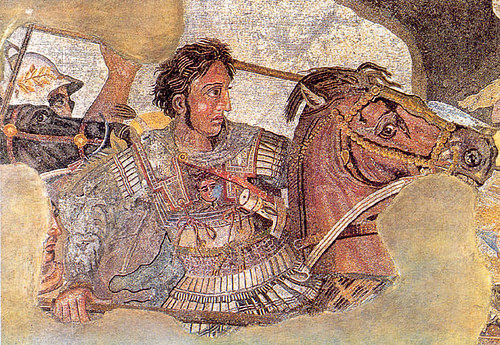
Even from a young age, Alexander showed maturity beyond his youth. His ability to conceptualize, anticipate, and take risks, was evident in his many victories. He persevered in Sogdia and in the Makran, hostile regions with vicious climates. Alexander maintained remarkable poise and exhibited leadership when all hung in the balance. When he took an arrow through the chest and another in the leg, he pressed on – the wounds only spurred him on to fight harder.
BATTLE OF GRANICUS: A LEADER (AND LEGEND) IS BORN
Alexander's battle at Granicus River was the most crucial military event in his life. Why would Granicus be more significant than the siege of Tyre, or the monumental battle of Gaugamela? At the time, Alexander was a young 22-year-old king and general. As far as the enemy was concerned, let alone his own men, Alexander was unproven in battle and faced a superior Persian force, headed by a seasoned military commander, Memnon of Rhodes. In addition to his lack of experience and questionable leadership skills, Alexander's army, before even meeting the Persians in battle, was already at a disadvantage. The Persians had scouted the area meticulously and sought the high ground on the east bank of the Granicus River. Fighting a superior Persian army commanded by an able general would prove a daunting venture. But Alexander, despite his youth, was decisive in his plan of attack and confident in his own ability. His brilliance lay in his bravado and daring charges; bold troop movements would allow him the opportunity to exploit openings in his enemies' ranks. His ability to read his opponent and adapt quickly to changing circumstances was uncanny. It was an invaluable tool that would be put to the test at the Granicus River and determine his status as a warrior king.
According to Guy Rogers (lecture, Thomas Edison State College, Trenton, NJ, Spring 2004), the bank would have been three to four meters high, which would be difficult for Alexander's men to traverse without taking heavy casualties. Moreover, the Persians could rush the crossing cavalry and annihilate them through sheer force. This contingency was the beginning of his prowess, so instead of an en masse movement across the river, an additional force would engage the Persians and make a pawn's sacrifice for Alexander and his men.
Amyntas and his cohort confronted the Persians while Alexander and his cohort swung around and penetrated the Persians from the flank. Alexander's intentions were realized when the Persians failed to engage the rest of his men with the same devastating force that they had unleashed on Amyntas. The situation for which Alexander had hoped opened up before his very eyes. Amyntas had given Alexander the opportunity and time to lead the Companion cavalry, Alexander's choicest warriors, into battle.
The Persian commander Mithridates met Alexander's assault and Alexander dealt with him like he would deal with many to come, he struck him in the face with a splintered spear. Alexander had killed a Persian commander in full sight of his men; a slight that would not go unanswered. Rhosaces and Spithridates, the brother of the slain Mithridates, pursued Alexander to finish the young upstart once and for all. Alexander was quick to react. He took the offensive against Rhosaces and gored him, but he inflicted a potentially fatal blow that left Alexander's scalp loosely intact. Disoriented and cleaved, Alexander did his best to get back to his men, all the while oblivious to Spithridates stalking close behind. As Spithridates came in for the kill, Cleitus cut him off and severed his shoulder from his body, thereby immobilizing the arm that held the scimitar that would have ended Alexander's great campaign before it had even begun.
It was a momentous victory, not because Alexander had been outnumbered two to one, which he was not, but because this was the battle which proved his ability as a capable commander and legitimated his rule as king. He had shown his men that he was a shrewd military commander and that he cared deeply for them. The 25 bronze statues commissioned by Alexander to Lysippus as grand memorials to brave Macedonians evidence this. Alexander also sent 3,000 suits of armor back to Athens with the inscription: "Alexander son of Philip and the Greeks, except the Spartans, from the barbarians who dwell in Asia."
But more importantly, Alexander laid the foundations of a relationship that would prove itself time and again until his death. After the battle, Alexander talked with many who had been wounded and asked them to tell him of their individual roles in the battle and how they received their wounds. By doing this, he formed an indestructible bond between him and his men. That bond would prove his greatest strength in the most trying times. Robin Lane Fox sums up Alexander's role in Granicus:
The bravery which bordered on folly never failed him in the front line of battle, a position which few generals since have considered proper; he set out to show himself a hero, and from the Granicus to Multan he left a trail of heroics which has never been surpassed and is perhaps too easily assumed among all his achievements. (495-496)
Sogdiana & the Sogdian rock
The hinterlands of the Persian Empire were remote and autonomous. They might even be said to be independent of Darius' rule. After Darius' death, Alexander, the newly crowned “King of Asia” saw fit to reestablish dominion over this insufferable region called Sogdia. Even though this adventure cost him two years of his life, the loss of many men, and extreme hardship throughout the whole ordeal, Alexander was able to press these obstinate barons as only he could. One of the most notable sieges occurred at the 'Sogdian rock'. Here his men were asked to literally 'fly' before the local barons would submit. Alexander's men did fly and perched themselves on the top of an adjoining mountain in full view of the besieged, which frightened the locals into a quick surrender. The second rock was more inaccessible, and even though the baron Sisimithres did not know it, it was impregnable. He was coaxed into submission by the baron of the first Sogdian rock, Oxyartes. Alexander's daring feat led to his victory and he was given access to Sisimithres' largess, which included a large store of badly needed foodstuffs. Alexander's army would eat until their bellies were content; they had endured trials and hardships that left them little more than ghosts of their former selves. This was a welcome respite where they could enjoy the fruits of their labor – no matter how ephemeral. While his ambitions lay in conquering all who stood before him, Alexander was confronted with the prospect of leaving his newly won kingdom to his subordinates. This would not do. Alexander needed to secure his conquest by having an heir to pass his kingdom to. Oxyartes' daughter, the enchantress Roxane, was a likely, if not foolhardy, choice.
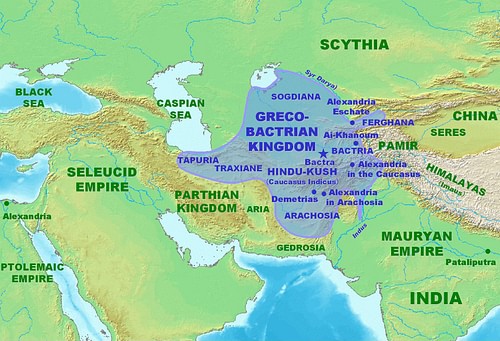
ALEXANDER'S GREATEST CHALLENGE – THE MAKRAN
According to Fox, "Not even the sum total of all the army's sufferings in Asia deserved to be compared with the hardships in Makran." (399) Makran was a wasteland if there ever was one. Between the accounts of Alexander's own officer, Nearchus, as well as the descriptive accounts of Fox and Green, a very uninviting picture is pieced together. Alexander's plans to invade India had been thwarted by the mutiny at Hyphasis. If he could not sate his ambitious desires in India, then he would return to the heart of the Persian Empire in grand style – through the Makran, the most infamous route to Mesopotamia. Queen Semiramis and King Cyrus are the only ones to have ever traversed it. Alexander saw this as a great opportunity to defy nature and fueled his mania to rival the feats of the gods. He was an adventurer and explorer at heart but knew he needed to be fully prepared to meet the challenges that lay ahead. He weighed historical reports with present intelligence and planned for most contingencies.
Still in the Punjab, Alexander assembled a fleet of ships that would accompany him by sea while he and his army traveled by land. Alexander was a dreamer; he believed he was fathered by a god and thought that no feat was impossible. But did he really know what he was getting himself and his men into by venturing into the Makran? Probably not, but his ingenuity and god-like example, a stellar feat under adverse conditions, must have been a great boost in morale for the men. If Alexander would even think of attempting such a gamble, then it must be possible. His men knew that whatever he conjured came to fruition. He had yet to know defeat, so why should this situation be any different?
Makran would be a "severe test", and probably this was the allure for Alexander. (Fox, 390) Knowing that others had attempted such a crossing and came out alive proved irresistible. He could not pass it up without surpassing such a feat. Throughout the journey, Alexander led by example even though he was suffering from a significant injury to his lung from an arrow back at Multan. One anecdote retold by Peter Green captures an inkling of the character of Alexander and the effects on morale are impressive:
Nevertheless, [Alexander] contrived to preserve his prestige and popularity by sharing the men's worst hardships. Once, when a helmetful of muddy water had been found for him in some nearby gully - but no more was to be had - he laughed, thanked the donor, and then tipped the water out into the sand. So extraordinary was the effect of this action that the water wasted by Alexander was as good as a drink from every man in the army. (434)
This gives us a glimpse into the enigmatic nature of Alexander, a man we can only hope to aspire to in times of hardship and a man we can only come to know through the eyes of those who knew him best.
Fox sums up Makran and Alexander's reasons for enduring it:
Makran was the ambition of men who wished to set a record and had nothing left to conquer but a landscape which Persia had left alone. The route was not merely difficult; it was the most hellish march that Alexander could possibly have chosen. But nobody opposed it. (403)
The most telling bit of information is the last sentence of that quote, "But nobody opposed it." Why did not anyone oppose it? The answer can be traced back to the River Granicus, where Alexander had won his men's loyalty and love for all time. He was the man everyone wanted to be and the man no one could refuse. At the end of their quest, they saw the "hill of Semiramis". It was a memorial for those who had come before and a relief to those who now passed by. "Semiramis' name greeted the survivors, so she could be said, for solace, to have gone through the desert too." (Fox, 402) But, in Alexander's defense, he did not come out with a mere twenty survivors but thousands.
REIMAGINING THE FUTURE: WHAT IF ALEXANDER HAD LIVED LONGER?
If Alexander had lived longer, he surely would have continued to indulge his thirst for conquering by going south into Arabia, north into the lands surrounding the Caspian, and West into North Africa. It is reasonable to assume that if he had lived, those countries would have been conquered in due time. Future campaigns had already been seriously considered and planned before his death in Babylon and were probably first conceived after Hephaestion's death at Hamadan. If he could triumph over the greatest empire in the known world in under a decade as a neophyte, just think what he could do at the height of his power. If Alexander had lived to an age comparable to Parmenio's, the ancient world might have been far different from what is recorded in history textbooks.
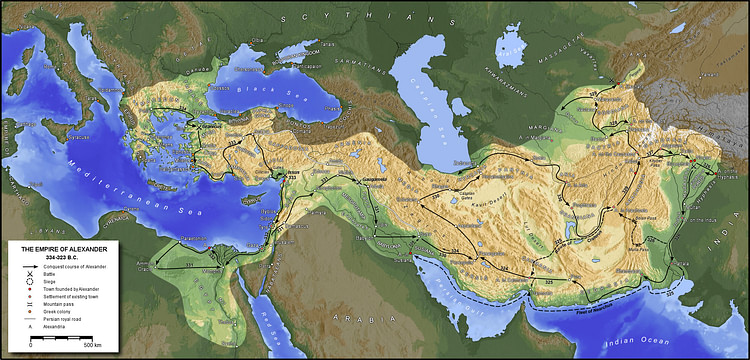
If Alexander's past record tells us anything, it is that those who he conquered had little to fear if they accepted his rule. He traditionally incorporated others' beliefs and practices into his own and often pushed them to the forefront. There were many precedents to favor such actions. However, there was one thing that native peoples might have had to fear - relocation and migration. While they might be allowed to keep their customs and their religions, they might be asked to 'mix' with other ethnic groups, like Macedonians, Greeks, and Persians. This was one of Alexander's last wishes, so it may have been implemented somewhere down the line.
Alexander would have been his empire's greatest strength. Like Napoleon, his presence was worth 30,000 men. The loyalty of all his men would have been crucial – which may have ultimately been his Achilles heel. Palace intrigue plagued the Roman Emperors and as Alexander's empire grew, his would be no exception. The more his ambitions dictated him, the more he became a slave to his own desires.
Alexander slowly but surely moved his way to be seen as a god, not as a king. It is possible he would have ruled as Ptolemy did in Egypt. It is reasonable to suggest that eventually he would be revered by all as a living god, not just as a son of a god. He was already depicted as divine on coinage and in song. Eventually, Alexander's empire, upon his death, would have been left to either his son or his appointed successors. His successor, in order to keep everything in order, would have to possess some of Alexander's qualities, particularly his military prowess, magnetic personality, and persuasive manner, the army's loyalty being essential. The dissolution due to the lack of such an heir was evident after Alexander's death and took a generation to end.
ALEXANDER REMEMBERED
This is the story of Alexander who traveled to the ends of the earth on a quest for conquest, glory, and a lasting fame that would surpass Achilles and the heroes of old. The idea to make the world his footstool was not a mere wish but a reality. Alexander knew that if he only thought of it, his men would see it through as long as he could win them over. Fox eloquently paints a stunning portrait of who Alexander was and continues to be in our hearts and minds:
He was famously generous and he loved to reward the same show of spirit which he asked of himself . . . Though he drank as he lived, sparing nothing, his mind was not slurred by excessive indulgence; he was not a man to be crossed or to be told what he could not do, and he always had firm views on exactly what he wanted. He was also a man of passionate ambitions, who saw the intense adventure of the unknown. He did not believe in impossibility; man could do anything, and he nearly proved it. Born in a half-world between Greece and Europe, he lived above all for the ideal of a distant past, striving to realize an age which he had been too late to share. (496-497)
Alexander has yet to be rivaled by man since his rule in the 4th century BCE. "Alexander's true genius", observes Green (488), "was as a field-commander: perhaps, taken all in all, the most incomparable general the world has seen." It is only a pity that Alexander did not have a Homer to record the greatness of his deeds and the guarded secrets of his heart. As Green concludes,
Yet his legend still lives; the proof of his immortality is the belief he inspired in others. That is why he remained greater than the measurable sum of his works; that is why, in the last resort, he will continue an insoluble enigma, to this and all future generations. (488)
If so, maybe we would hold in high esteem the hero of the classic Alexander the Great, instead of the heroes in the classic works of the Iliad and Odyssey. Alexander would have been delighted to rival the heroics of Achilles in a work retold from father to son through the generations. Thereby his memory and deeds would be remembered for all time.

